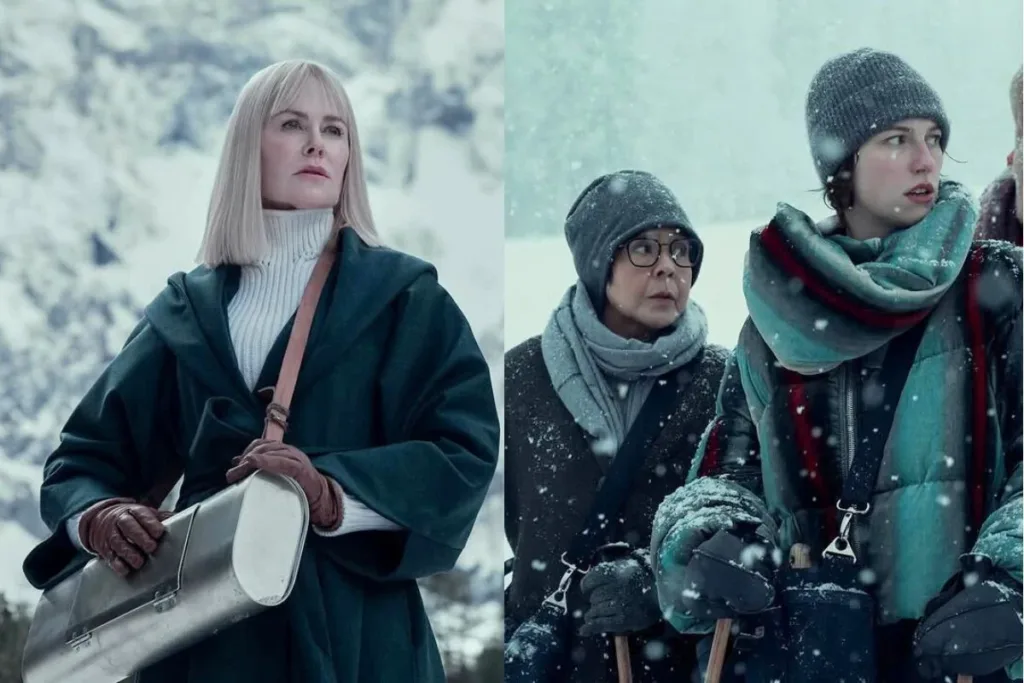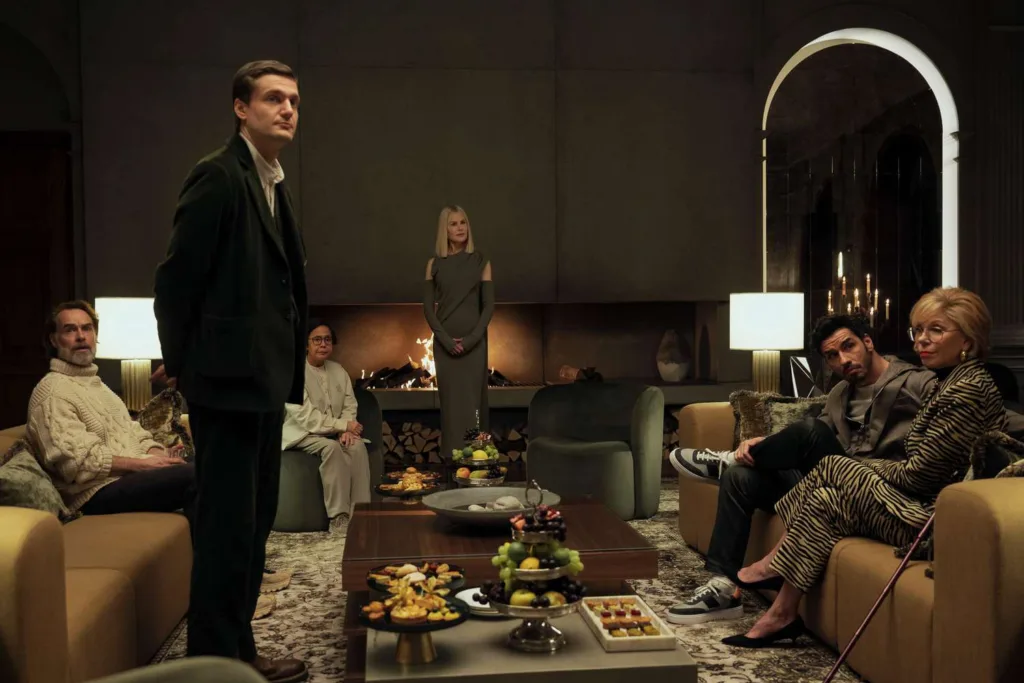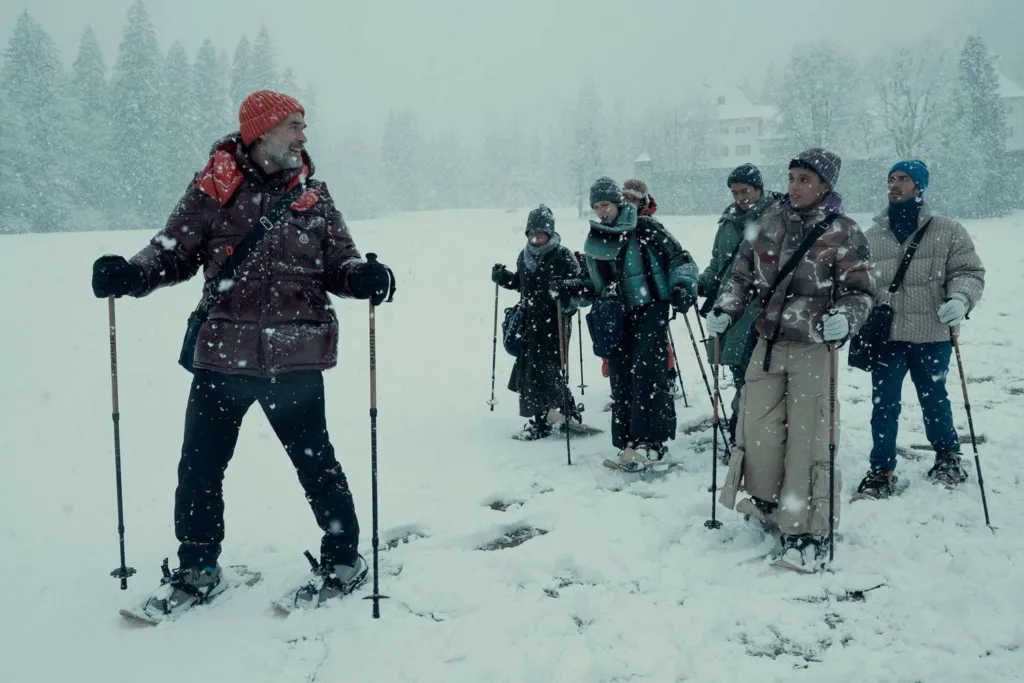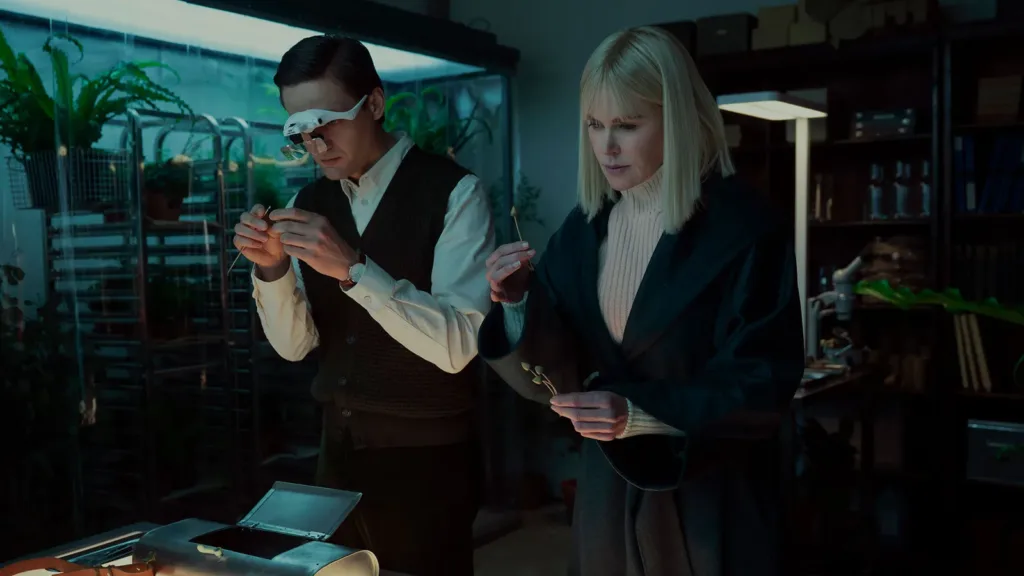One might posit that the 21st-century malaise, a peculiar blend of hyper-connectivity and profound disconnection, perpetually seeks its aberrant apothecaries. And lo, from the televisual ether, emerges a familiar purveyor of expedited enlightenment, Masha Dmitrichenko, the high priestess of psychedelic shortcuts. Nine Perfect Strangers, as a concept, thus returns, not with a whisper but with the distinct clink of curated trauma being unpacked in yet another aesthetically pleasing, if morally ambiguous, locale.
This second iteration sees Masha (the ever-watchable Nicole Kidman, naturally) transplant her controversial wellness theatrics from sun-drenched shores to the rather more austere, perhaps historically resonant, climes of the Austrian Alps. A new, secluded, and doubtlessly expensive facility becomes the crucible for another collection of carefully selected, exquisitely damaged souls, each seeking some form of psychic surgery from their bespoke afflictions.
The landscape itself, shifting from the languid tropics to the crisp, imposing peaks, telegraphs a potentially sharper, more unforgiving spiritual excavation ahead; a landscape where the ghosts (both personal and, one might imagine, historical) have fewer palm trees to hide behind. One anticipates a chillier, perhaps more introspective, descent into the self.
The Ice Queen of Introspection: Masha’s Alpine Ascendancy
Masha Dmitrichenko returns, less a character and more a shimmering, silver-bobbed (the wig, a character in itself, now a more glacial affair than its previous incarnation) avatar of the contemporary wellness-industrial complex. Nicole Kidman embodies her with a fascinating, if sometimes remote, iciness; the Russian accent, once a defining feature, now occasionally wavers, offering a peculiar meta-commentary on the very construction of this enigmatic persona (a Putin-related justification offered in-show feels almost too glib, a knowing wink at its own artifice).
She is simultaneously a celebrated “disrupter” – that darling term of late-stage capitalism for anyone who successfully monetizes an existing human need – and a figure shadowed by federal investigations, a duality that the series wears lightly, perhaps too lightly. Her relocation to Zuberwald, an imposing Austrian sanatorium managed by a former mentor, Helena (Lena Olin, radiating a weary gravitas), suggests less a retreat and more a strategic repositioning. The motivations remain tantalizingly opaque: is it genuine belief in her increasingly baroque methods, a desperate flight from accountability, or simply the next phase in her brand expansion?
The Alpine setting itself is a masterstroke of pathetic fallacy, or perhaps just canny production design. Zuberwald, a name that practically echoes with the ghosts of treatments past, swaps the lush, almost suffocating verdure of Season One’s Tranquillum for a landscape of stark, snow-laden grandeur. This is not a place for gentle dissolution; it’s a fortress of enforced introspection, its history as a sanatorium imbuing Masha’s pseudo-scientific pronouncements with an unearned weight of medical tradition.
The visual palette is all cool blues and sharp whites, a far cry from the humid, fecund chaos previously on offer. Helena, and her somewhat earnest scientist son Martin (Lucas Englander), ostensibly provide guardrails, a nod to ethical oversight, though one suspects they are merely stagehands in Masha’s meticulously orchestrated psychodrama.
At the heart of this new operation lies a “psychedelic delivery system,” a technological advancement that promises to allow patients to revisit and reprocess “formative memories” with surgical precision. It’s a seductive premise, this notion of a techno-fix for the soul’s deepest abrasions. Masha’s approach, then, has ostensibly evolved: from vaguely dosed smoothies to a more direct, almost digitally mediated interface with the subconscious. One is left to ponder whether this refined technique offers true clarity or merely a more sophisticated form of illusion, a high-definition replay of trauma without the necessary tools for genuine integration.
The Curated Wounded: A Roster of Affliction
Into Masha’s alpine crucible step the new supplicants, a veritable Whitman’s Sampler of modern discontents, each bearing their psychic stigmata with varying degrees of resignation or defiance. There is Brian (Murray Bartlett, channelling a spectacular sort of public-shame-induced implosion), a children’s television host whose career was torpedoed by a viral meltdown, now finding solace, or perhaps an uncomfortable mirror, in the company of his former puppet sidekick – a fuzzy, inanimate vessel for so much unprocessed grief. We meet Agnes (the remarkable Dolly de Leon), a former nun whose crisis of faith seems intricately woven with the haunting spectres of a past life as a wartime nurse, her piety now a hollow shell around a core of profound spiritual ache.
Then there are the intertwined duos. Tina (musician King Princess, in a surprisingly textured acting debut), a piano prodigy whose passion has curdled into apathy, arrives tethered to her girlfriend Wolfie (Maisie Richardson-Sellers), the latter embodying that uniquely contemporary figure: the aggressively supportive partner whose ministrations teeter perilously close to control. The dynastic anxieties are represented by Peter (Henry Golding), the affable scion yearning for connection with his emotionally barricaded billionaire father, David (Mark Strong, radiating a chilly gravitas).
David, it transpires, is not merely a guest but a figure from Masha’s own shadowed past, a pre-existing fault line beneath the curated serenity. And completing this menagerie of the maladjusted is the family unit of Victoria (Christine Baranski, deploying her signature élan), a grand dame clinging to youth via her handsome, much younger lover Matteo (Aras Aydin), much to the simmering disapproval of her estranged, perpetually uptight daughter Imogen (Annie Murphy, a master of weaponized dissatisfaction). The air between mother and daughter crackles with a lifetime of unspoken resentments and unmet expectations.
These souls, ostensibly strangers, begin to orbit one another with the cautious curiosity of inmates in a rather luxurious asylum. Initial interactions are a tapestry of awkward deflections, subtle power plays, and the hesitant unfurling of long-held traumas – each confession a bid for understanding, or perhaps merely a required offering at Masha’s altar. The narrative insists on Masha’s “careful selection” of this cohort, hinting at a web of unseen connections, a karmic (or perhaps just contrived) destiny that has drawn them to this specific purgatory. It’s a conceit that plays with our contemporary paranoia about curated realities, the sense that unseen algorithms – or in this case, a Siberian shaman with a penchant for pharmaceuticals – are subtly engineering our encounters and our fates.
Tripping Towards Truth (or Further Confusion)
The narrative’s engine, much like in its prior incarnation, is the “healing” process itself – a carefully regimented descent into the psyche via Masha’s proprietary psychedelic interventions. These journeys into “formative memories” are rendered with a stylistic flair that often prioritizes visual lushness (think surreal vignettes and symbolic dreamscapes) over lucid psychological insight.
As an audience, we are frequently told these hallucinatory sojourns are pivotal, yet the connection between the trippy visuals and actual character breakthroughs can feel tenuous, an interpretive leap demanded rather than earned. Moments of supposed epiphany often arrive with a neatness that belies the messy reality of trauma, interspersed with the requisite confusion and resistance that feels more like narrative stalling than genuine character struggle.
Amidst this structured unraveling, several threads compete for attention. The central mystery – Masha’s history with the billionaire David Shaw and her complex relationship with the Zuberwald matriarch, Helena – simmers with a low-grade intensity, though its ultimate revelations may not entirely satisfy those craving profound intrigue.
More compelling, perhaps, are the emergent interpersonal dynamics: the tentative, almost predictably therapeutic romance between Peter and Imogen (united by the common enemy of parental neglect, a potent if well-worn adhesive) and the surprisingly tender friendship that blossoms between the disgraced puppeteer Brian and the crisis-stricken ex-nun Agnes. These smaller, more human connections often resonate with a greater authenticity than the grander, Masha-orchestrated transformations, some of which occur with a rapidity that strains credulity given the series’ limited episodic canvas.
Thematically, the season casts a wide, if sometimes shallow, net. It gestures towards the enduring weight of trauma and grief, explores the thorny terrain of dysfunctional family dynamics (the series certainly understands the Larkin-esque notion of inherited damage), and attempts a critique of wealth, power, and accountability, primarily through David’s character and Masha’s own ambiguous moral standing. Brian’s storyline offers a somewhat glancing blow at “cancel culture.”
Agnes’s arc, however, provides a more focused and often moving exploration of faith, failure, and the arduous path to self-forgiveness. Yet, the overarching question of Masha’s ethics and the true nature of her “healing” remains frustratingly ambiguous, caught between genuine therapeutic intent and a kind of high-gloss charlatanism. The season’s rhythm can feel uneven, at times languidly paced, only to accelerate towards twists that occasionally land with the thud of predictability rather than the gasp of surprise, some even feeling like faint echoes of previous contrivances.
The Human Element: Grace Notes in a Grand Experiment
Whatever the narrative undulations or thematic ambitions, Nine Perfect Strangers Season 2 certainly does not skimp on assembling a veritable gallery of estimable performers, each tasked with breathing life into their assigned portion of psychic distress. Murray Bartlett as Brian, the disgraced puppeteer, offers a compelling study in public shame and private anguish, his interactions with a felt companion often more poignant than those with his human counterparts.
Dolly de Leon, as the former nun Agnes, is a standout, conveying oceans of doubt and sorrow with a quiet, concentrated power that feels utterly grounded amidst the surrounding high-concept theatrics. Christine Baranski, as the flamboyant Victoria, does what Christine Baranski does best: she electrifies nearly every frame she inhabits, delivering barbs with impeccable timing, even if her character’s therapeutic journey feels somewhat perfunctory. Henry Golding, too, manages to imbue Peter with a charm that transcends his somewhat generic “son-of-billionaire” template.
Nicole Kidman’s Masha, the glacial eye of this therapeutic storm, remains a figure of studied enigma. Her performance is consistent in its chilly intensity, though the (in-show explained) slight dissipation of her Russian accent lends an intriguing, if perhaps unintentional, layer to her constructed persona. She is, at times, more of a spectral presence this season, a catalyst observed from a slight remove, which occasionally diminishes her gravitational pull.
The ensemble chemistry is, by necessity, a mixed affair given the sheer number of players and the limited runway for deep relational development. Certain pairings, such as Bartlett’s Brian with de Leon’s Agnes, discover an unexpected, gentle chemistry. Others, particularly the familial entanglements, crackle with a more believable, if often fractious, energy.
While many actors strive to imbue their roles with specificity that pushes beyond caricature, the sheer volume of stories means some characters inevitably feel less fleshed out, their potential (one thinks of Lena Olin’s underused Helena) curtailed by the demands of a crowded narrative canvas. The talent is palpable; the opportunity for each to fully shine, less so.
The Alpine Aesthetic: Polished Surfaces and Psychic Murk
Visually, Nine Perfect Strangers Season 2 is undeniably a handsome production, a feast for eyes perhaps starved for vicarious luxury. Cinematographer Frank Lamm crafts images of the Austrian Alps that are both sprawling and stark, leveraging the majestic, snow-draped landscape to evoke a sense of isolated grandeur.
The interiors of Zuberwald, the historic sanatorium turned wellness retreat, are steeped in a kind of opulent gloom, all rich textures and shadowed corners that whisper of history and perhaps a touch of high-end confinement. This is prestige television that certainly looks the part, every frame meticulously composed.
Where the aesthetic enterprise becomes more precarious is in its depiction of the characters’ psychedelic voyages. These sequences, intended to plunge us into the swirling depths of formative memory and subconscious revelation, are often a riot of dreamy symbolism and bold, occasionally disorienting, camerawork.
While striving for a creative immersion into altered states, they frequently suffer from a kind of interpretive opacity; the audience is presented with a visual smorgasbord, yet the precise emotional or narrative significance can remain frustratingly elusive, a private trip for the character that doesn’t quite translate. One might say they are “experiential” for the characters, but merely spectatorial, and sometimes bewildering, for us.
The musical score and sound design diligently work to enhance the atmosphere, underscoring moments of suspense or supposed emotional breakthrough with a competent, if not always groundbreaking, touch. Directionally, the season maintains a cohesive, polished style, with some episodes showcasing inventive title sequences that nod to cinematic history (a Saul Bass homage here, a silent film card there – fleeting moments of stylistic playfulness). However, this surface gloss and occasional creative flourish in individual sequences do not always coalesce into a consistently gripping episodic rhythm, occasionally allowing the visual craft to outpace the narrative drive.
Echoes from the Alps: A Fading Resonance
One departs from Masha’s latest alpine sanatorium with a distinct sense of diminishing returns. The question of this second season’s fundamental necessity hangs heavy in the rarefied mountain air; it often feels less like an organic narrative expansion and more like an exercise in franchise maintenance, a further dilution of Liane Moriarty’s original, self-contained vision. While the anthology format holds inherent promise for a concept such as this, this iteration struggles to carve out a truly distinct or compelling identity beyond “more of the same, but colder.”
The series oscillates between atmospheric psychological drama, a somewhat anemic thriller, and fleeting attempts at social satire, never quite settling into a confident, cohesive tone. Moments of genuine insight or emotional depth, often delivered by its capable cast, are frequently adrift in a narrative that can feel both overstuffed with characters and undernourished in its thematic exploration. The ambitious attempts to grapple with trauma, healing, and the human condition ultimately leave a rather faint intellectual or emotional footprint.
What lingers, then, is the image of a beautifully crafted vessel, populated by talented actors, navigating somewhat shallow waters. The experience of watching is punctuated by moments of engagement – a sharp performance here, a stunning vista there – but these are too often islands in a sea of ponderous pacing and telegraphed revelations. It’s a retreat that promises transformation, but delivers something closer to a stylish, if ultimately forgettable, sojourn.
Season 2 of Nine Perfect Strangers is set to premier on May 21, 2025, on Hulu.
Full Credits
Creators: David E. Kelley, John-Henry Butterworth, Samantha Strauss
Showrunners: David E. Kelley, John-Henry Butterworth
Directors: Jonathan Levine, Anthony Byrne
Writers: Rachel Shukert, Jaclyn Moore, Dan Robert, Lisha Brooks, Sarah Sutherland
Executive Producers: Nicole Kidman, David E. Kelley, John-Henry Butterworth, Samantha Strauss, Bruna Papandrea, Steve Hutensky, Per Saari, Molly Allen, Jonathan Levine, Jodi Matterson, Liane Moriarty
Producers: Gillian Bohrer, Barbara Gibbs
Cast: Nicole Kidman, Murray Bartlett, Annie Murphy, Christine Baranski, Dolly de Leon, Maisie Richardson-Sellers, King Princess, Aras Aydın, Lucas Englander, Henry Golding, Mark Strong, Lena Olin
Composer: Marco Beltrami, Miles Hankins
The Review
Nine Perfect Strangers Season 2
While Nine Perfect Strangers Season 2 boasts a typically strong ensemble cast and stunning Alpine visuals, this return to Masha’s world of psychedelic healing feels largely unnecessary. The narrative stumbles through underdeveloped themes and uneven pacing, offering polished surfaces that mask a surprisingly hollow core. Moments of individual brilliance from the actors are insufficient to salvage a season that promises profound transformation but delivers a largely forgettable, if picturesque, journey into well-trodden territory.
PROS
- Strong ensemble cast with standout individual performances.
- Visually striking cinematography and lavish Alpine setting.
- Some compelling character concepts and isolated poignant moments.
CONS
- Narratively uneven and often predictably plotted.
- Superficial exploration of complex themes.
- Feels like an unnecessary continuation struggling for purpose.
- Psychedelic sequences often lack clarity and impact for the viewer.
- Overstuffed with characters, leading to underdeveloped arcs.




















































